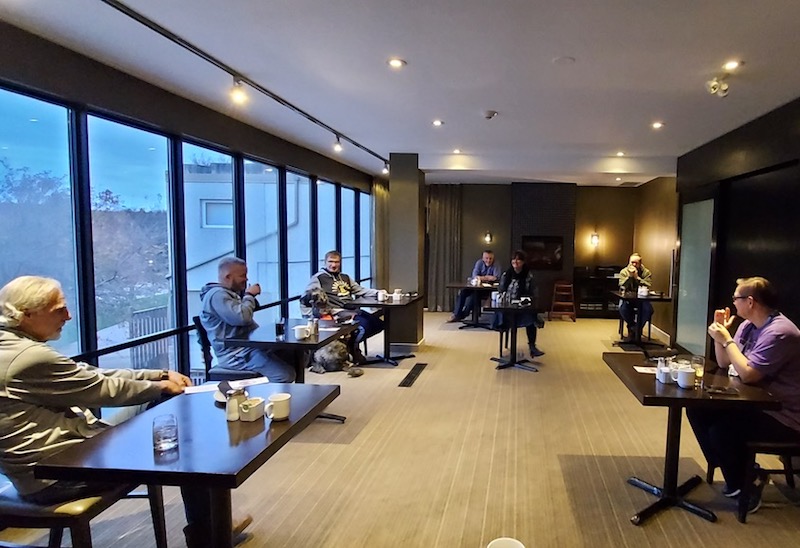News
Help to heal from the dark side of human nature
Published on November 11, 2020 by David Wylie

Remembrance Day is a positive affirmation from the public for soldiers who often deal with the darker side of human nature, says Lt.-Col. Steven Boychyn.
“We who wear a uniform, especially the veterans, will see and participate in some rather ugly situations,” says Boychyn, who served in Kosovo with the Canadian Armed Forces.
Being at the centre of traumatic events takes its toll on soldiers and first responders. This year, an organization that helps those suffering with PTSD is receiving financial support from a Canadian cannabis company.
Canopy Growth is donating up to $90,000 to help Wounded Warriors Canada provide trauma counselling. The donation comes from Canopy’s medical division, Spectrum Therapeutics. The company is also matching donations from partners, patients and staff through the month of November, up to an additional $20,000.
The organization has already put $50,000 of the donation to use by providing group-based trauma therapy programs across Canada, including Couples Overcoming PTSD Everyday (COPE), the Spousal Resiliency Program, and the Trauma Resiliency Program.
There is no cost to the participants—all programs are run because of government support, as well as donations from corporations and individuals.
Boychyn, who remains active in the Armed Forces, is also the health services co-ordinator for Wounded Warriors Canada.
“We have a specific and slightly changed outlook on life because we chose to wear a uniform,” he says, adding that’s why it’s important to meet with others who have similar experiences.
Boychyn says COVID-19 has had an impact by isolating people from their supportive communities.
He’s completed the Trauma Resiliency program, a group-based, clinically led program that helps people deal with traumatic events.
This is the first time Canopy has donated to Wounded Warriors Canada.
While Boychyn doesn’t personally use medical cannabis, he says he’s heard of its benefits.
“With the legalization of cannabis, the ability for military personnel to access this as a medical treatment without being looked at sideways or in a derogatory manner has been tremendous.” — Lt.-Col. Steven Boychyn
Hilary Black, Chief Advocacy Officer at Canopy Growth, has worked with veterans who use medical cannabis for more than 20 years. She founded the British Columbia Compassion Club Society in 1997 to offer an access point for cannabis patients in need.
“It provides tremendous benefit to them—whether it’s managing the symptoms of PTSD or anxiety, or veterans that are managing chronic pain from injuries,” she says.
The funding from Canopy is helping the organization adapt to the pandemic as it continues to provide services.
“COVID has put an incredible pressure on this community of people,” she says. “The folks at Wounded Warriors were forced for a period of time to stop providing all of their in-person services. Anyone who is dealing with mental health impacts during COVID, the increased isolation can really exaggerate any kind of mental and emotional health issues.”
Black says the stress of PTSD can cause relationships to fall apart. One of the programs provided by Wounded Warriors helps couples overcoming PTSD, as spouses are included in the therapy work.
She says vets are one of the patient populations that the federal government strongly supports, even paying a portion of their cannabis costs. Canopy has a department dedicated to helping vets and top up whatever costs that vets face above what the government will supplement per gram.

Hilary Black, Chief Advocacy Officer at Canopy Growth
“Big picture, we’re really seeing a change in the role and responsibility that corporations play in the world. We’re really seeing the onus of that responsibility shift and change, and the most successful and beloved companies in the world have social purpose deeply integrated into the fabric of their companies,” says Black. “And so for me, the cannabis industry is an extension and an evolution of a movement. I spent my life dedicated to that movement. And I continue to because I believe that repealing prohibition in America and around the world in the same that we have in Canada will create tremendous good in the world. Cannabis prohibition is based in misinformation and also is systemically and inherently racist.”
She encourages people to make a donation at the Wounded Warriors Canade website.
Leave a comment on our Facebook page.
© Copyright 2020 Okanagan Z. | About the oz.
Report a Typo or Inaccuracy
We strive to avoid typos and inaccuracies. However, on occasion we make mistakes. We value your contributions and help in correcting them.